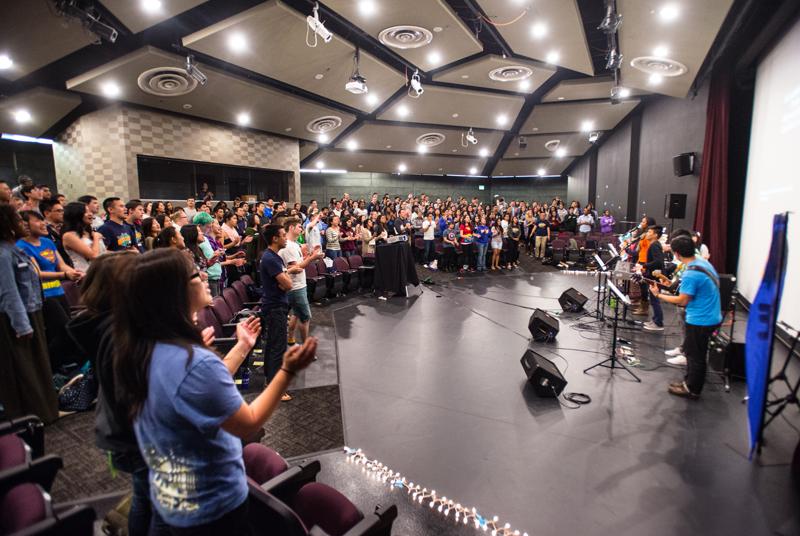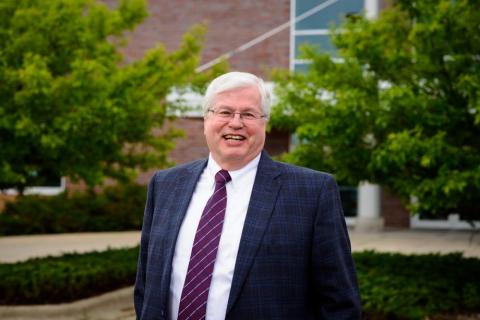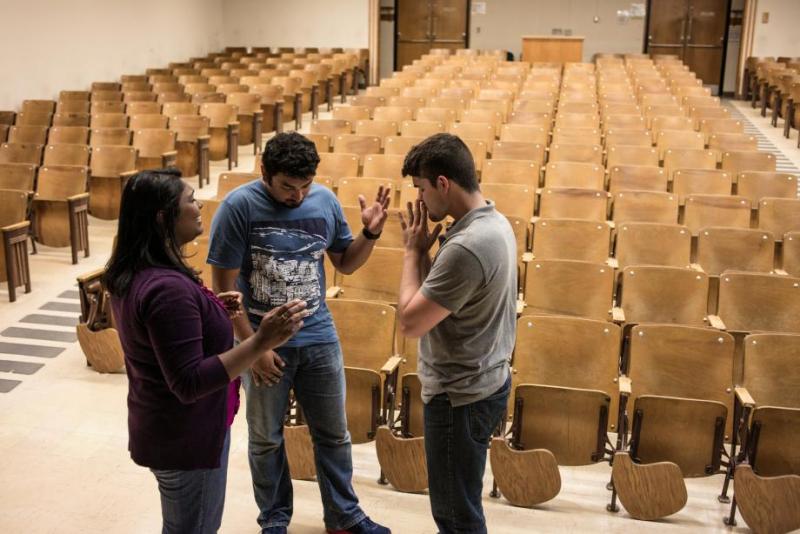In 2011, Michael Vazquez transferred from a private college in Massachusetts to enter his junior year at Weber State University in Utah. During his first week on campus, some students invited him to InterVarsity Christian Fellowship’s chapter meeting.
Over the course of that year, Michael says his faith “went from casual faith to something that felt real and authentic for me.” He feels indebted to the quality of discipleship that InterVarsity offered. They taught him how to study Scripture and showed him Jesus’ love for him.
But in his first year at Weber, LGBTQ issues rose to the surface at a student senate meeting where he and another InterVarsity student were in attendance. He remembers hearing sentiments like “Homosexuality is against God’s plan” and that LGBTQ rights were “just a liberal agenda that will destroy the sanctity of marriage.”
In that moment, Michael felt unsafe. He couldn’t share with the group that he is gay. He felt like he had to hide who he was in order to survive the moment. Still, he pushed back against the tide of condemnation that filled the room — a little too heated, maybe, but he made his point.
Michael says he was reported to the InterVarsity staff worker on his campus who told him he misrepresented Christ at the student government meeting. Michael had not yet reconciled his faith with his sexuality. At his core, he believed it was OK to be gay. But because he was so young and had found a home in InterVarsity, he was willing to follow his staff worker’s lead.
large_group_full.jpg

In 2013, Michael graduated and helped plant a ministry at the University of Utah. While his ministry was thriving on campus, behind closed doors, Michael says his staff team leader was praying for healing from homosexuality. When that didn’t work, Michael says his staff leader began to push him to date women and, later, to watch heterosexual pornography to be healed. (InterVarsity disputes parts of Michael’s account, saying, “if a staff member ever recommended pornography to a student or staff member … InterVarsity would immediately investigate and if verified, take disciplinary action.”)
Earlier this month, Elizabeth Dias reported in TIME that InterVarsity Christian Fellowship announced to its 1,300 employees on 667 campuses nationwide that it was about to implement a plan to “involuntarily terminate” employees who held a different theological view than the one stated in their newly adopted Theological Summary of Human Sexuality.
That announcement has led to: 40 authors of InterVarsity’s publishing house calling on the organization to revoke the policy, a Change.org petition posted by concerned alumni that has garnered more than 1,500 signatures, and other various forms of protest across social media.
How Did We Get Here?
Over the course of the past ten days, I spoke with various people inside and outside the organization in an attempt to understand how InterVarsity found itself in this situation. In the interest of full disclosure, I served on staff with InterVarsity for 10 years in Los Angeles, first as a campus staff member at UCLA, then as the Director of Racial Reconciliation for the Greater Los Angeles Division, and finally as the Southern California specialist in reconciliation. I’ve written several books, all of which drew from strong foundations in Scripture study and hermeneutics gained during my years with InterVarsity.
InterVarsity traces its roots back to the University of Cambridge in 1877 where students gathered for prayer and Bible study. The organization took root in the U.S. in 1941. It was the tail end of the great church split that forged two major paths for white churches in the U.S.: either the way of the modernists (now identified as the liberal or progressive church), or the path of the fundamentalists. It was also the beginning of World War II — a time when the country cried for stability.
In an 2008 interview for my first book, Evangelical Does Not Equal Republican…or Democrat, former InterVarsity president, Dr. Steve Hayner, explained that the fellowship sprang from soil along the fundamentalist path and was one of several mid-20th century institutions that sprang up from the same soil, including: Young Life, Billy Graham Association, and Christianity Today.
Rev. Dr. Carolyn Davis, deputy director of the Center for Public Theology at Wesley Seminary, shared at a recent gathering that many of these mid-century institutions were established, in part, to offer spiritual and institutional stability in changing times.
Times are changing again. Several high-level InterVarsity leaders confirmed in interviews with me that the seeds of the new policy were planted in response to a time of great change after the first decade of the 2000s. A 2010 report celebrates the success of a massive investment in a push by the organization to reach new students. This decade-plus of growth coincided with a time of massive gains for the LGBTQ rights movement in the U.S., as state after state adopted first, civil unions, and later, same-sex marriage rights; in 2011, the Pentagon’s ‘Don’t Ask, Don’t Tell’ policy was repealed. InterVarsity students and staff began to ask for resources, saying they needed tools to better understand the church’s historic teaching on human sexuality, primarily on LGBTQ issues.
urbana_full.jpg

Another structural issue threatened the organization’s ability to minister on campuses across the country: From late 2011 through 2012, InterVarsity was “derecognized” on 24 campuses across country for requiring student leaders to abide by InterVarsity’s Doctrinal Basis and/or Chapter Covenant. While most leaders say these outside threats were not the driving force behind the current policy, many recognized they were part of the context within which decisions were made.
Cultural uncertainty was the context in 2011, when Michael was first reported to his staff worker. And uncertainty of InterVarsity staff members’ own convictions and ability to answer students’ questions regarding their sexuality was the context when the Cabinet undertook the task of clarifying InterVarsity’s theological position on human sexuality.
IVCF Draws a Line: A Timeline of Events
In early 2012, Amy Hauptman — a former campus worker and member of the national communications team — says she received a letter from the organization introducing the task force’s paper “Responding to the LGBT Movement: A Theological Statement,” noting that it was a work in progress, but they expected all staff to read it. Hauptman said she expressed concerns to her supervisor and was told she may want to consider leaving staff if she could not abide by the theology. At that point, she had been on staff for six years.
That version was sent in 2012. In 2014, Jason Jensen, who is in charge of all West Coast campus ministries, was commissioned by the Cabinet to lead a roll-out effort for the statement. According to Jensen, the process included:
- distribution and review of video modules that clarify the theological position on human sexuality and how InterVarsity leadership came to their decisions,
- a review of a new Staff Code of Conduct, which presented an overview of key policies related to the paper, and
- review — and engage in an open and safe discussion of — the final paper itself, now called, “A Theological Summary of Human Sexuality.”
Jensen’s team began the roll out in March 2015 with the announcement that staff would have 18 months — with a deadline of Nov. 11 — to process through all three pieces of input. In the end they will be expected to affirm they both “believe and behave” in accordance with InterVarsity’s theological position.
“Believe and behave.” This is the crux of the objection.
Believe and Behave
Bob Fryling, former vice president of InterVarsity and publisher of InterVarsity Press, told Sojourners that there were numerous Cabinet meetings to discuss what ‘believe and behave’ would mean.
“Would it mean not publicly contradicting the paper?” Fryling said. “Would it mean without any question of dissent? How would it allow people who are still struggling to know what they understood the Bible to mean?”
According to Fryling, it was an ongoing discussion until the final clarification was sent to staff. That Staff Code of Conduct was offered in an amended version that included a definition of “believe and behave,” dated August 18, 2016 — eight days after InterVarsity’s new president, Tom Lin, was commissioned as the next president of InterVarsity:
For the purposes of this paragraph, “To believe and behave” means employees (1) agree with the substance and conclusions of the Theological Summary of Human Sexuality, (2) will not engage in sexual immorality as defined in this paragraph, and (3) will not promote positions inconsistent with the Theological Summary of Human Sexuality.
While there is a wide spectrum of responses to the theological paper itself as it relates to LGBTQ issues, inside the organization and outside, no one I spoke with objected to InterVarsity’s right to form its own theological understanding of human sexuality. Indeed, a view of covenantal sexuality, connecting sex to marriage, is well appreciated. The root of the objection is in what many see as a break from InterVarsity’s usual way of integrating theological statements into the lifeblood of its staff and students.
In the past, InterVarsity has not demanded that its staff “believe” new sensitive theological statements, say, regarding women in leadership or multiethnicity. Rather, the organization has allowed for dissent in the mind provided the staff worker is able to submit to the organization’s theology in practice, thus abiding by the call to “behave” in accordance with the organization’s position.
Rev. Dr. Ken Fong, self-proclaimed champion for InterVarsity and former Board of Trustees member invited by former president Hayner, says he was puzzled by the inclusion of the requirement for staff to “believe” the theological paper.
“It feels like the first time ever that InterVarsity is policing the mind,” Fong told Sojourners. “… as long as we hold the essentials high, then we can still disagree on some of these other things and we can still be together. And that’s what it was like to be with InterVarsity.”
Fong added, “… The question is: ‘What happened to my Intervarsity? … What is driving this?”
Greg Jao, InterVarsity vice president and director of campus engagement, has served as the public spokesperson for InterVarsity, representing the Cabinet and president. I asked Jao, who has served as an InterVarsity staff member for 21 years, how he responds to Fong and others who question the inclusion of the word “believe.”
2012.06.07_gregjao.jpg

“Part of our decision-making was because this was a reiteration of what we historically expected staff to be, we were not going to ask staff to sign something or ask if they still disagree,” Jao said. “… The desire was: Here’s where InterVarsity is, we trust our staff to act with integrity as adults and to acknowledge that we’re parting ways over this — to encourage staff agency and leadership on it.”
But considering that the church as a whole has landed in different places on LGBTQ issues, is it appropriate for a parachurch organization that serves students from many denominations, to take such a hard stance?
“I think I still say ‘Yes’ it’s appropriate,” Jao said. “This has actually been a position we’ve held historically. We’ve reiterated the process because an assumed consensus has changed around us. … On women in leadership, we take a position that several denominations would disagree with. I guess I disagree in part because we actually do ask people to believe in the affirmation of Women in Ministry.”
But InterVarsity’s statement on Women in Ministry does not require belief — only that staff submit to InterVarsity’s egalitarian position by their behavior. The current policy reads: “Consistent with our historical commitment to women leaders in the Fellowship, we support by our behavior InterVarsity’s ‘Women in Ministry Statement of Affirmation.’” (p. 2, InterVarsity Staff Code of Conduct, updated Aug. 18, 2016)
Requiring a need to “believe” in addition to behavioral submission in the case of LGBTQ issues was a break from InterVarsity’s norm.
And nowhere in the original documents was the actual lived consequence of disbelief in InterVarsity’s theology of human sexuality made plain — that the organization would engage in “involuntary termination.” In fact, Jason Jensen said that when the first three documents (video modules, code of conduct, theology paper) were distributed in 2015 “the end game was unclear.”
How to Process a Potential Split
In the first of nine video modules spelling out a curriculum on InterVarsity’s position, staff members were guided through an 18-month process dubbed “open” and “safe.” Then, 16 months into their process, on July 25, 2016, staff received a letter from the outgoing interim president, Jim Lundgren, and the incoming president, Tom Lin. In the letter, the writers outline a clear process for those who find they do not align with the Theological Summary of Human Sexuality — they are encouraged to exercise integrity and come forward to resign within two weeks of revealing disbelief.
jimlundgren-interimpresident.jpg

Fred Everson, who served in a number of InterVarsity positions from 1993-2015, is one of those who left because of the policy’s mandate to believe.
Because of Everson’s missions work with InterVarsity, he learned to listen and approach other cultures with humility. He shared one critical lesson he learned that laid foundations for his engagement with the LGBTQ community: “Power and agenda can affect what policies are made and how firmly they may be held to.”
“My desire was that InterVarsity would create space for process and for difference,” Everson lamented, “an open-ended space that admitted that we don’t know where this will end up.”
Jao admits that the purpose of the theological paper was not to engage people who disagree: “Our desire was to communicate affirmation of what we thought, not how we came to this decision. That’s what the curriculum was designed to do. For folks wrestling with the issue, those resources are readily available.”
The module curriculum, obtained by Sojourners, doesn’t actually engage the arguments of alternative voices. The curriculum relies heavily on the work of one popular traditionalist theologian, Wesley Hill, along with stories of staff and one transgender student. Notably, nearly all of the individuals represented in the videos are white.
In one of the nine modules, a single bullet point encourages participants to read a book written by Matthew Vines, a popular alternative voice. In the same bullet point, other alternative voices, such as Rev. Dr. David Gushee, Justin Lee, and Ken Wilson are listed without offering their credentials or the titles of their books. There is no mention of the most academically acclaimed work on the topic, Bible, Gender, Sexuality: Reframing the Church’s Debate on Same-Sex Relationships, by evangelical scholar James V. Brownson. The next bullet point highlights a rebuttal to Matthew Vines by a popular traditionalist voice with a direct link to that author’s article. And the document where these alternative views are mentioned (or not mentioned) is titled: “Additional Study.”
I spoke with Gushee, Distinguished University Professor of Christian Ethics at Mercer University and author of 19 books including his recent, Changing Our Mind, which combs the Scriptures in search of theological and ethical guidance on LGBTQ issues.
What Gushee finds most interesting in the current climate is that the tone of the traditionalist view has been softened “as the cries of pain and outrage on the part of gay people and those who love them has finally been registered.”
“You might call it a soft traditionalism,” Gushee said, “which I would put as roughly akin to the soft traditionalism of the kind of modern voices that oppose women in ministry, but don’t want to be mean about it.”
Indeed, one of the modules includes two litanies of Lament, something that members of the organization’s queer community pressed for to help the organization understand the suffering of LGBTQ community members. One confession in the litany reads:
“CONFESSION: We have often used the pulpit with ignorance or without compassion, causing damage rather than healing. We shepherds have often failed to discern the needs of our sheep.”
A second, two confessions down, reads:
“CONFESSION: We have cut LGBTQ people off from our Christian communities, leaving them alienated - while at the same time ignoring or excusing other sins and brokenness in the community.”
The Parameters of a Hermeneutic
Within the teaching curriculum, InterVarsity focuses an entire module setting the parameters of its hermeneutic. The handout states: “We take a text-centered, historically and culturally informed, and canonical approach to interpreting the Bible.”
Wesley Hill is featured in the module’s video component, sharing that the Matthew 19 story about Jesus’ rebuke of divorce, pointing back to Genesis 1 and 2, helped shape his beliefs. In his reflections on Genesis 2 he begins: “It’s a much more detailed story about male and female. Now they have names: Adam and Eve.”
Actually they don’t have names, yet. All but one use of the word adam in Genesis 2 actually means human being. It is not a proper name. And the name Eve never comes up in Genesis 2. Rather, the first gendered language that appears in the Genesis 2 text is ish (male) and ishshah (female). These words appear for the first time after God removes the rib from the gender-neutral human being’s body.
students_praying_full.jpg

At the conclusion of his argument Hill concludes: “So, when Jesus is asked about marriage. He doesn’t just quote the part about connection and sameness. He reaches back to Genesis 1 and quotes the bit about male and female; equal, yet different.”
But, Jesus was not asked about the proper framework for marriage. He was asked about the permissibility of divorce.
“One basic hermeneutical principle is that you should read texts based on what they are clearly trying to accomplish in context,” Gushee said. “What Mark 10 and the parallel Matthew 19 are doing in context are dealing with divorce, especially dealing with the problem of Jewish men in Israel attempting to stretch Jewish law as broadly as possible, in order to divorce their wives as freely as possible. Matthew 19 and Mark 10 are about divorce.
“... What I would say is: The literalist reading of Genesis 1-2 precludes honest consideration of the fact that they [LGBTQ people] don’t fit a binary paradigm and tells them you have two options: You can either attempt to change your psychology, sexuality and gender so that you fit our reading of Genesis 1 and 2, which is really what the church has said to gender and sexual minorities for centuries, or we will allow you to remain in our community, as long as you do not act on the sexuality that you have. That’s the celibate option. That is what people like Wesley Hill have been told and have come to believe is normative for themselves.”
What Could Redemption Look Like?
I sat in a room full of black evangelical leaders called together in February 2015 in response to the string of police-involved shootings and the rise of Black Lives Matter. We were there to offer counsel to a similar college ministry, mostly white, created in the same stabilizing era as InterVarsity. The civil unrest found them at a loss for a response. They wanted us to tell them what they didn’t know. Dr. Carl Ellis stood and offered these sage words: “Evangelicals tend to major in theology, but only on the epistemological side (knowing what God teaches). We are deficient on the ethical side (knowing how God calls us to live).”
When I asked Gushee, a leading evangelical Christian ethicist, how he would approach InterVarsity’s policy-making challenge through the lens of Christian ethics, he replied: “I think that a kingdom of God framework … has you lean forward into the movement of God’s redemption in the world, which looks like justice for those on the margins, inclusion of those who have been excluded, and deliverance of those who have been oppressed.”
In the midst of swift and disruptive loss and change, the supportive web of relationships between LGBQ staff and allies — including the Queer Collective, an internal support network — has continued. Most that I talked to would have stayed on staff had they been given the option to simply submit to the theological paper. Others have been disillusioned by the process as a whole, especially as they have witnessed the impact on their students.
I spoke at a church in New York City recently. Knowing that I served on InterVarsity staff for 10 years, the pastor confided that a gay student attending his church had such a transformative time in the fellowship, but now feels abandoned and betrayed.
Former InterVarsity staff member, Max Kuecker, recently opened the process to launch a new welcoming and affirming evangelical student ministry on campuses across the country. He and his wife, incorporated Incarnation in April 2016. They launched Oct. 11 — one month from the deadline for staff to declare belief or lack of agreement with the organization's theological paper.
“Part of my hope is to create more space in the church for LGBTQ people by demonstrating that a Christ-centered, Bible-believing LGBTQ ministry can thrive,” Kuecker told me via email.
Kuecker is based in Chicago and has not, yet, launched ministries on any campus. Since the TIME article broke, Kuecker said he has been contacted by 10 staff candidates and three InterVarsity chapters considering affiliating with Incarnation.
“I wish we didn’t have to exist,” Kuecker said. “So many people share my deep love for InterVarsity. They shaped our relationship with Christ at the time in our lives when we were owning it for ourselves. They have continued to shape it with their push for racial reconciliation. I want to do what I can to maintain as healthy of a relationship with IV as possible, for the sake of any staff who might join us, and especially for the sake of the students who are being affected by this.”
Scott Bessenecker, InterVarsity’s interim director of missions, shared a vision of redemption with me: What could it look like for InterVarsity to commission staff and students to enter campus ministries that have landed differently on their theology of human sexuality? He began to dream about how InterVarsity could help people to transition well out of InterVarsity and into a space where God could minister to their souls more fully.
But how do we get there?
Perhaps we begin with Intervarsity’s own lament:
Lord, please heal the wounds of shame and condemnation in the LGBTQ community – especially those caused by your people. And heal us as your people, Lord, from all unrighteous judgment, callous insensitivity, and blind arrogance.
Got something to say about what you're reading? We value your feedback!

